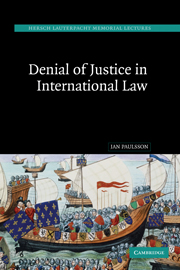Book contents
- Frontmatter
- Table of Contents
- Acknowledgements
- Authorities
- Abbreviations
- 1 The renaissance of a cause of action
- 2 The historical evolution of denial of justice
- 3 Three fundamental developments
- 4 The modern definition of denial of justice
- 5 Exhaustion of local remedies and denial of justice
- 6 Denial of justice by outside interference
- 7 Denial of justice by the decision-maker
- 8 Remedies and sanctions
- 9 The menace of ‘obscure arbiters’?
- Bibliography
- Index
6 - Denial of justice by outside interference
Published online by Cambridge University Press: 29 July 2009
- Frontmatter
- Table of Contents
- Acknowledgements
- Authorities
- Abbreviations
- 1 The renaissance of a cause of action
- 2 The historical evolution of denial of justice
- 3 Three fundamental developments
- 4 The modern definition of denial of justice
- 5 Exhaustion of local remedies and denial of justice
- 6 Denial of justice by outside interference
- 7 Denial of justice by the decision-maker
- 8 Remedies and sanctions
- 9 The menace of ‘obscure arbiters’?
- Bibliography
- Index
Summary
This chapter – and the next – describes a field which is anything but limited to a handful of precedents. Given the prodigious expansion of international commercial arbitration over the past half-century (the increase of trade being its fundamental cause, and the 1958 New York Convention on the Recognition and Enforcement of Foreign Arbitral Awards its primary instrument) modern practitioners may be excused for believing that we are living in an unprecedented golden age of international arbitration. They would be surprised to learn how vast international arbitral jurisprudence was in the nineteenth century. In the period between 1814 and 1898, for example, one study enumerated no less than 158 different international tribunals, including the celebrated commissions created in 1853 between Britain and the US; in 1868 between Mexico and the US; and in 1880 between France and the US. All of these bodies were created by treaty, some to resolve only one dispute, but others to deal with many cases over a period of years.
Denial of justice was a dominant theme in early international arbitrations. We have already examined the reason in Chapter 4. Denial of justice was the primordial private grievance to give rise to diplomatic protection. Indeed, claims whose true basis were quite different – such as expropriation or breach of contract – were frequently cast as denials of justice on the conceptual basis that the initial wrong had not been repaired by the local judicial system.
- Type
- Chapter
- Information
- Denial of Justice in International Law , pp. 131 - 175Publisher: Cambridge University PressPrint publication year: 2005

